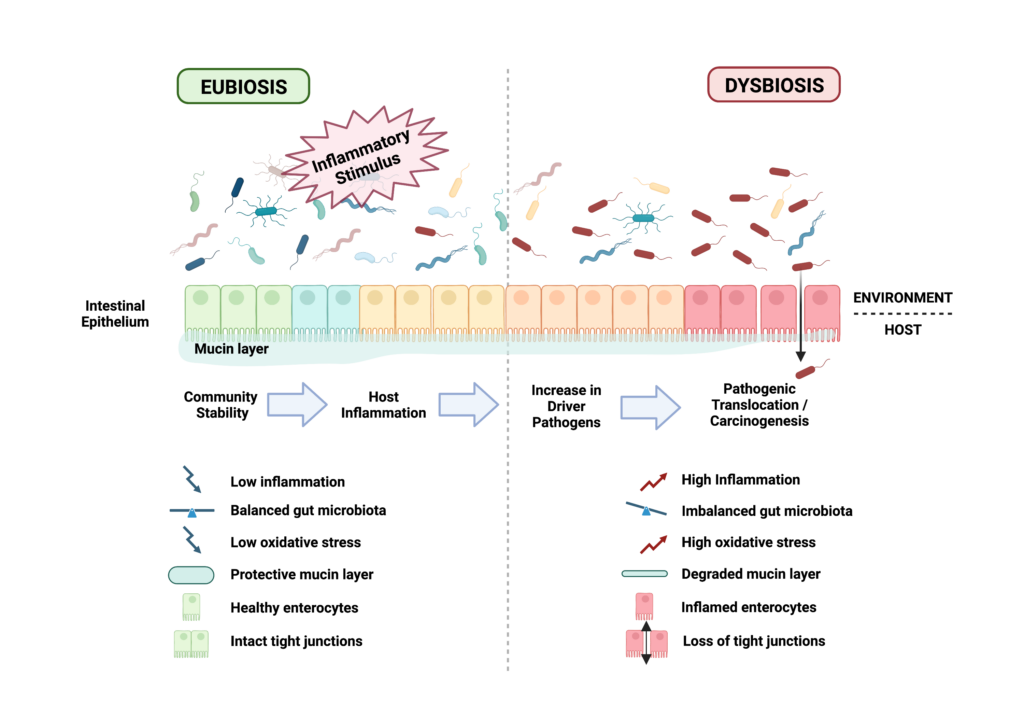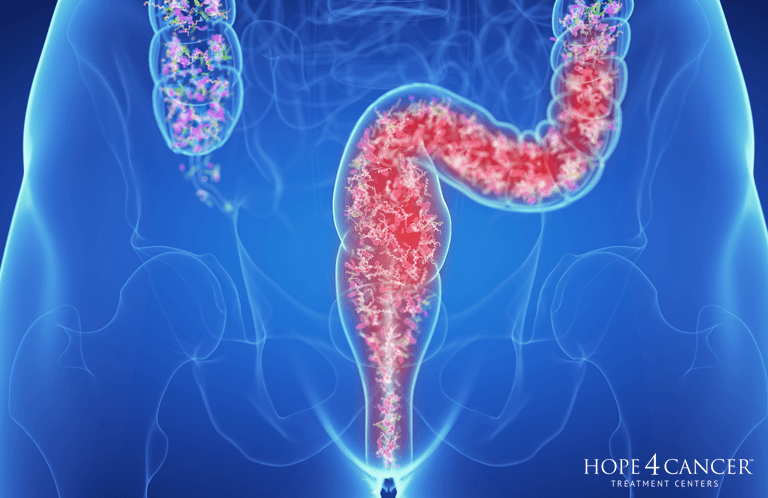The human body plays host to trillions of microorganisms living in harmony as a community called the microbiome. The bacteria, fungi and other microbes making up the microbiome live all over us – in our mouths, on our skin, and most abundantly in our gut – and pay their “rent” by helping us maintain our health. Because of how diverse it is, research is still ongoing to determine exactly how the microbiome helps us and what health issues may emerge if it is disturbed.
So, What’s the Link to Cancer?
Recent research has indicated close links between dysbiosis (the disturbance of the balance in our microbiome) to the onset of several gastrointestinal cancers, most strongly being linked to colorectal and stomach cancers [1, 2]. A healthy gut microbiome is essential to protect intestinal lining and prevent the growth of harmful bacteria. Disrupting the microbiome will allow for increased levels of inflammation in the intestinal and stomach linings [3]. Chronic inflammation can promote the development of precancerous lesions which can ultimately develop into invasive cancers.

Figure 1. Schematic diagram representing the induction of dysbiosis from inflammatory stimuli (adapted from [2]). As inflammation increases in the gut, pathogenic microbes start to dominate. The mucin (mucosal) layer becomes thinner, and the tight gaps between the cells of the intestinal wall become compromised, allowing pathogens to infiltrate the host.
The introduction of several harmful bacteria into the microbiome can promote dysbiosis. A well-known example is the Helicobacter (H.) pylori bacteria, whose presence in the gut microbiome has been closely linked to the development of ulcers and stomach cancer [4]. H. pylori promotes inflammation in the stomach, which can lead to degradation of the lining which protects it from the hydrochloric acid typically used to break down food. The disruption of this lining and chronic inflammation creates the perfect environment for cancer cells to develop and thrive.
A lack of certain helpful bacteria can also lead to the development of cancers. For example, Bifidobacteria, which commonly help to digest carbohydrates, has been shown to play roles in treating ulcerative colitis and other diseases of the gut when used as a probiotic [5]. However, if we do not have a sufficient amount of Bifidobacteria, we develop several gastrointestinal issues, including the potential for chronic low-grade inflammation in the gut lining [6]. This can serve as a major risk factor for the development of colorectal cancer.
What Can I Do to Prevent This?
Proper health is a balancing act – always making sure that we do not have too much or too little of these bacteria. Here are some ways to promote a healthy microbiome:
- Eat a varied and balanced diet: We source our gut microbiome primarily from the foods we eat. Consuming a well-balanced diet rich in fruits, vegetables, whole grains, and legumes can help promote the growth of beneficial bacteria in our gut.
- Avoid processed foods: Processed foods contain a lot of sugar, fats, and preservatives, all of which can play a significant role in the development of harmful bacteria and the disruption of your microbiome.
- Take probiotics: Like we saw with our friend Bifidobacterium, having the right amount of beneficial bacteria is important. Supplementing with probiotics is a good way to ensure that we are promoting balance in our microbiome.
- Reduce alcohol and tobacco consumption: Alcohol and tobacco consumption have been linked to the development of several types of cancer, including gut cancers. There is also risk of disrupting the environment of our microbiome and, thus, promoting dysbiosis.
For additional information on the microbiome and the cancer connection check out our other blogs, Breast Cancer and the Microbiome: Part 1 and Breast Cancer and the Microbiome: Part 2.
References:
[1] Artemev A, Naik S, Pougno A, et al. The association of microbiome sysbiosis with colorectal cancer. Cureus. 2022; 14(2): e22156.
[2] Sheflin AM, Whitney AK, Weir TL. Cancer-Promoting Effects of Microbial Dysbiosis. Curr Oncol Rep. 2014; 16(10: 406.
[3] Takiishi T, Fenero CIM, Câmara NOS. Intestinal barrier and gut microbiota: Shaping our immune responses throughout life. Tissue Barriers. 2017; 5(4): e1373208.
[4] Wroblewski LE, Peek, Jr., RM, Wilson, KT. Helicobacter pylori and Gastric Cancer: Factors That Modulate Disease Risk. Clin Microbiol Rev. 2010; 23(4): 713-739.
[5] O’Callaghan A, van Sinderen D. Bifidobacteria and Their Role as Members of the Human Gut Microbiota. Front Microbiol. 2016; 7: 925.
[6] Hakansson A, Molin G. Gut Microbiota and Inflammation. Nutrients. 2011; 3(6): 637-682.




Dear Hope4….
Thank You so much for Your Patient education!
There ARE so many of us – who can not go as far as Mexico to get Your fabulous treatment,
but we are able to open our eyes to the problem not to be adding more to it – with our own acts.
Thank You very much!
We so appreciate your support and we are happy to hear this was beneficial for you!